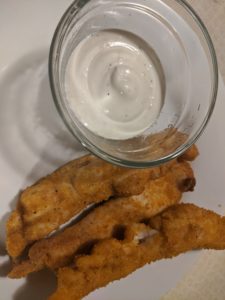As the hysteria surrounding COVID-19 continues to impact the availability of food and hygiene/sanitation supplies, I’ve noticed a surge in visits to my blog. Specifically, folks seem to be concerned about keto food storage in emergency situations. I’ve addressed this topic several times on the blog, but I thought it wouldn’t hurt to reiterate some key ideas.
Before I share my preparedness strategies though, I want to take a minute to remind everyone to BREATHE! When our reactions are fear-based, we tend to make dumb decisions, and we tend to forget how to think logically. Folks are worried about feeding their families, so they’re cleaning out stocks of foods they don’t even eat (or know how to prepare), and they’re buying enough toilet paper to last their family for years because they’re worried about supply issues. If folks had thought and planned before reacting, I doubt we’d be seeing many of the problems that we’re seeing today.
With all that being said, if you’re still reading, you’re probably looking for some practical strategies for handling food issues during an emergency. As I’ve said before, an emergency, perceived or otherwise, is no excuse to abandon your way of life because you haven’t planned ahead or you think it’s “too hard” or “too expensive” to stick with your health eating plan. There are five people in my household who eat keto, and trust me, an emergency is the LAST place I want to find myself managing mental health issues, blood sugar issues, and inflammation issues simply because I hadn’t planned. Times of stress are NOT the times when we want to lose it and give up.
Frankly, the majority of our preps rely on us sheltering in place. Obviously, during a quarantine situation, this would be the most likely scenario, so I’ll dive deep into the strategies that we use to support our preparedness.
Copy-Canning
I’ve talked about this concept before in other posts, but if you’re new to the idea, it works like this. After tracking, I have discovered that my family uses one can of mixed nuts every two weeks. If my goal is having four weeks worth of food storage, I buy two cans of nuts on this pay period, and I put one of the cans in my pantry. Then, when the next pay period rolls around, I do the same thing. At the end of that second pay period, I now have four weeks worth of nuts in my pantry.
Pantry management is important with this strategy though because you don’t want to buy things that get buried and forgotten. To avoid that, I rotate from my pantry so oversights don’t happen. Keeping with the mixed nuts example, on the third pay period (where I’ve already established my four-week supply of mixed nuts), I’ll simply take the oldest can of mixed nuts from my pantry and I’ll replace it with a fresh can from the store.
This strategy allows you to slowly accumulate a supply of foods that your family actually uses, and because pantry rotation is a habit that you’ve already established before you have to rely on it, you won’t fall victim to panic buys and wasted money and food.
And don’t forget. Just because this technique is called “copy-canning” doesn’t mean you can’t use it with other foods. I’ve used this technique to add depth to my chest freezer inventory as well as supplements, over-the-counter medications, toiletries, and household cleaning supplies.
Meal Prep
Most of us who’re keto use some form of meal prep. In the context of emergency preparedness, however, I’m asking you to look at it in a slightly different way. This winter, we had influenza in our house. We were all feeling varying degrees of awful, and there were times when I didn’t feel like eating, let alone cooking for my family. In times like these, it’s nice to have extra servings of cooked meat, casseroles, soups, and the like that can be pulled from the freezer (or a canning jar) and reheated. Don’t plan on using every single morsel of food from your meal prep, and heavens, don’t throw away leftovers. Put them in some sort of bag or container, label them, and put them back for a rainy day. It’s amazing how many meals you can put back without really trying!
As I mentioned above with the copy-canning though, it’s important to pay attention to the food that’s put back. Every so often, eat one of those meals and replace it with something fresh. That way, you’re not relegated to eating food in an emergency that’s so old that it is unidentifiable.
Thinking outside the Box
If you’ve found yourself feeling woefully unprepared, you still have options. The current state of affairs in my state has caused me to look at my preps and evaluate what I actually have on hand. Right now, I’ve been stocking my preps with the foods that we typically eat, and I’ve been pulling from my preps with a more intentional plan to store the stuff that I’d prefer to rotate through — not just the stuff that I’d eat because I had no other choice.
Also, in doing that, I’ve found that I have more food than I thought I did, and that helps to alleviate the bit of anxiety that we all feel when it comes to testing our preps. Eat some of that stuff that you wouldn’t normally choose to eat so you can have more of the things that appeal to you now. For example, I had this phase where I loved meatballs. I found a bunch on sale at Sam’s Club, so I bought them for a really great price and I put them in my freezer. I made a good dent in them, but eventually, I got tired of eating them. I still have meatballs in my freezer, but I’d rather have that space filled with whole cuts of beef and pork. Now would be a perfect time to use up some of those meatballs and rotate in new food, and we won’t be unhappy about doing that. It’s just not what we’ve preferred to do recently.
Lastly, I’ve considered fasting if there’s a true shortage of food. Some folks may not realize that compared to eating inadequate food in a time of stress, eating no food is easier on the body and comes with some really great physical and mental health benefits. Of course, you have to make sure that you have access to clean water and electrolytes, but that’s absolutely one of the strategies I would use to get through a rough time.
We have options, and as I said above, if we stop, breathe, and think, we’ll be OK. Remember that what we do matters!
Related Links:
- How to Purge and Organize Your Pantry — a really great episode from one of my favorite podcasters on pantry management
- Build Your Pantry the Right Way — another great episode from Nicole Sauce over at the Living Free in Tennessee podcast
- Real Talk Episode 157: Cutting Through The Hype And Hysteria About The Coronavirus (COVID-19) — a pretty common-sense discussion of COVID-19
- Shelf-Stable Keto Long-Term Food Storage — an article I wrote last fall to address some questions I saw in preparedness circles



